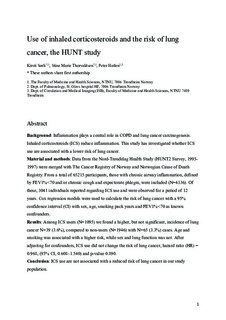Use of inhaled corticosteroids and the risk of lung cancer, the HUNT study
Master thesis
Permanent lenke
http://hdl.handle.net/11250/2456149Utgivelsesdato
2017Metadata
Vis full innførselSamlinger
Sammendrag
Abstract
Background: Inflammation plays a central role in COPD and lung cancer carcinogenesis. Inhaled corticosteroids (ICS) reduce inflammation. This study has investigated whether ICS use are associated with a lower risk of lung cancer.
Material and methods: Data from the Nord-Trøndelag Health Study (HUNT2 Survey, 1995- 1997) were merged with The Cancer Registry of Norway and Norwegian Cause of Death Registry. From a total of 65215 participants, those with chronic airway inflammation, defined by FEV1%<70 and/or chronic cough and expectorate phlegm, were included (N=4136). Of these, 3041 individuals reported regarding ICS use and were observed for a period of 12 years. Cox regression models were used to calculate the risk of lung cancer with a 95% confidence interval (CI) with sex, age, smoking pack years and FEV1%<70 as known confounders.
Results: Among ICS users (N=1095) we found a higher, but not significant, incidence of lung cancer N=39 (3.6%), compared to non-users (N=1946) with N=65 (3.3%) cases. Age and smoking was associated with a higher risk, while sex and lung function was not. After adjusting for confounders, ICS use did not change the risk of lung cancer, hazard ratio (HR) = 0.968, (95% CI, 0.608–1.540) and p-value 0.890.
Conclusion: ICS use are not associated with a reduced risk of lung cancer in our study population.
